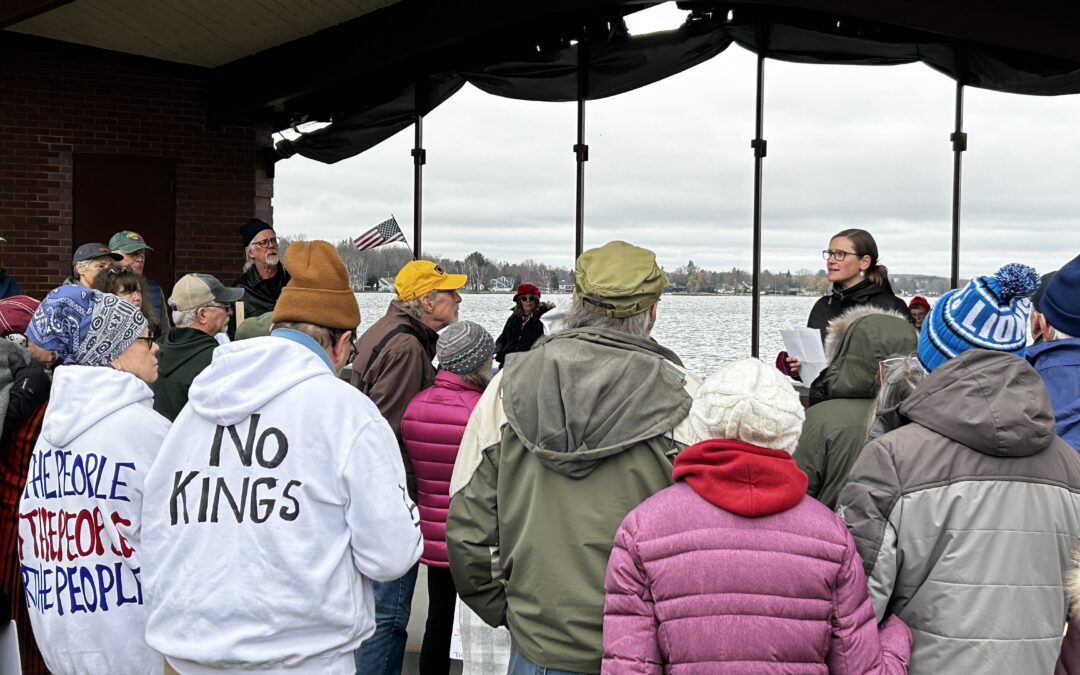A Call to Defiance, Dignity, and Due Process
First, I want to thank Bill for his powerful remarks, Cadillac Cares for making this space possible, and all of you for attending today’s exercise in activism.
Bill spoke about the vital importance of due process—how it is both a principle and a promise. And when that promise begins to fray, what’s at stake isn’t just procedure. What’s at stake is the freedom, safety and well-being of every single American.
When due process erodes, so too does the floor beneath all of us.
I come to you today as a professional social worker.

Erin Barbus, LMSW, speaks during the Cadillac Cares Day of Action.
For the past 24 years, I’ve worked in our publicly funded behavioral health system. In that time, I’ve worn many hats. These roles have allowed me to learn, connect, and be profoundly inspired by the people and communities I’ve had the privilege to serve as well as those I have worked beside. And in those roles, I came to understand a very particular kind of due process: The due process guaranteed to Medicaid beneficiaries through the 14th Amendment.
Let me be clear:
For millions of Americans, Medicaid is not just an insurance card—it’s a lifeline. And it’s currently facing an 880 billion dollar cut over the next 10 years. That would be 2 billion dollars per year in Michigan. Currently in Michigan, Medicaid insures 1 million children; 300,000 people living with disabilities; and 168,000 seniors.
Additionally, 45% of births in Michigan are covered by Medicaid. That rate is just over 60% for our county!
And the 14th Amendment says you cannot just take that lifeline away without:
- fair notice,
- a chance to be heard,
- and an opportunity to challenge that decision.
These are not luxuries. They are rights. And they are under threat.
We Are Not Just Imagining It: Systems Are Being Undermined
Let’s name it for what it is: the resources that support our society’s basic wellness—mental health care, food assistance, education, housing—are not just under pressure. They’re under attack and are being systematically dismantled.
And here’s where I borrow from my clinical background:
When evaluating a bundle of symptoms, we start with an assessment. And I don’t necessarily disagree with today’s diagnosis. Yes, there’s room for improvement. Yes, we must be vigilant about efficiency and effectiveness.
But the proposed treatment plan?
It’s completely out of bounds. It’s chaotic. It’s professionally misguided.
It’s like prescribing radiation for strep throat.
It’s like sending a patient with a broken ankle to a cardiologist.
We already have robust systems in place to address fraud, waste, and abuse. These are spelled out in federal law. What we don’t have are the resources or political will to fully fund, implement and staff those systems.
The real abuse?
It’s in the unfunded mandates placed on already-fragile programs. It’s in the moral gymnastics required of providers trying to do more with less—year after year.
And What Happens When These Needs Are Ignored?
Let’s be perfectly honest:
Mental health needs won’t go away.
Children won’t stop being hungry or having specialized educational needs.
Trauma doesn’t vanish because budgets get cut.
What happens instead is the burden gets shifted—to the wrong systems. We send the broken ankles to the cardiologist.
We route trauma through law enforcement.
We ask emergency rooms to manage what social systems have abandoned.
We burn out our teachers, nurses, and officers because we have not staffed up the systems designed to hold the weight.
So—How Do We Hold Ourselves Together in This?
Because yes, it is heavy.
We are carrying grief.
We are managing moral injury.
We are, in many ways, the hope-holders for our communities—and hope is not light.
Let’s take a moment to understand this weight on our well being, what happens when we exist in despair.
When we live in a constant state of fear, stress, or outrage, we are idling in the fight, flight, or freeze response. That response is protective—but it is not sustainable.
If we are to resist effectively—if we are to imagine and build a better way forward—we must activate the part of us capable of reflection, collaboration, and deep resolve.
So, What Do We Do Now? Here’s How We Move Forward Together:
Be unsurprised.
The ability to be shocked by injustice is a privilege. Many people in our country have never had that luxury. If we stop being surprised, we start being strategic.
Name it.
Euphemisms don’t help us. Call it what it is: systemic erosion. Neglect. Injustice.
Check in.
With yourself. With your people. Build the relationships that sustain us for the long haul.
Accept the opportunity in chaos.
Sometimes, systems have to break so we can rebuild them differently. The breaking isn’t the end—it’s the beginning.
Activate. Take one step!
On days that you feel exhausted, overwhelmed, paralyzed take one step. Be defiant in small, daily ways. Don’t obey in advance. Don’t pre-comply. That’s what they count on.
In Closing
Thank you—for your time, your labor, your heart.
Thank you for continuing to show up in the face of despair.
**Now more than ever—let’s take good care.**
Care of ourselves.
Care of one another.
Care as a form of resistance.
Because when care is radical and defiant, it becomes a force that systems cannot erase.
Let’s hold that care. Let’s build with it.
Let’s never give it up.
Thank you.



“When care is radical and defiant, It becomes a force that systems cannot erase.” Thank you Erin.
Thank you Erin. Your thoughtful speech was exactly what we needed to hear today.
Thank you Erin for all the hard work you do for the Wexford Dems.
Thank you for pointing out the needs of people who are already in need and rely on programs like Medicaid.
We have to continue to ban together and draw strength from each other.